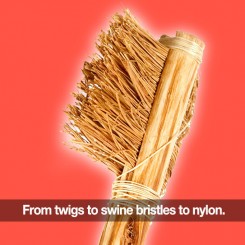
WHERE WOULD WE BE without our toothbrushes?! Today personal dental hygiene is easy for you AND your child with convenient tools like toothbrushes and floss. But have you ever wondered what people did before modern toothbrushes? Take a quick tour of the history of the toothbrush with your child!
Twigs & Branches
The earliest toothbrushes were actually “chewing sticks”. That may sound rudimentary, but they were surprisingly effective. In ancient Babylon people chewed on twigs until they became shredded and fibrous. That created a “brush” that they’d use to clean their teeth. Depending on the plant used, additional antiseptic properties or naturally occurring fluoride may have even been found in those twigs. Many cultures still use Miswak chewing sticks (made from a twig of the Salvadora persica tree) for oral hygiene.
Chinese Boar Bristle Brushes
Around the 15th century the Chinese invented one of the earliest toothbrushes, made from boar bristles pasted onto handles of bamboo or bone. These brushes worked just like modern toothbrushes do, although they were a little more harsh on one’s teeth (and a little less sanitary).
European Sponges & Cloths
Most Medieval Europeans didn’t bother with oral hygiene. However, the meticulous few would clean their teeth using a sponge or cloth dipped into a solution made of oils and salts. It was probably better than nothing!
Toothbrushes Today
Modern materials like nylon bristles and plastic handles have made toothbrushes inexpensive and accessible to nearly everyone. And now, we see all kinds of toothbrushes, from smart ones that tell you where to brush, to singing ones that make oral hygiene fun for kids.
Does The Brand Of Your Toothbrush Matter?
Many parents ask what kind of toothbrush is best for their child. Typically it’s best to use one with soft bristles, but the kind of toothbrush your son or daughter uses doesn’t matter as much as the fact that they use it for two minutes, twice a day. Ask your child: if their own modern toothbrush wasn’t around, which of these ancient methods would they try? We’d love to hear their answers, so let us know in the comments section below. And remember, if you ever have any questions about your family’s oral health, ask us!
